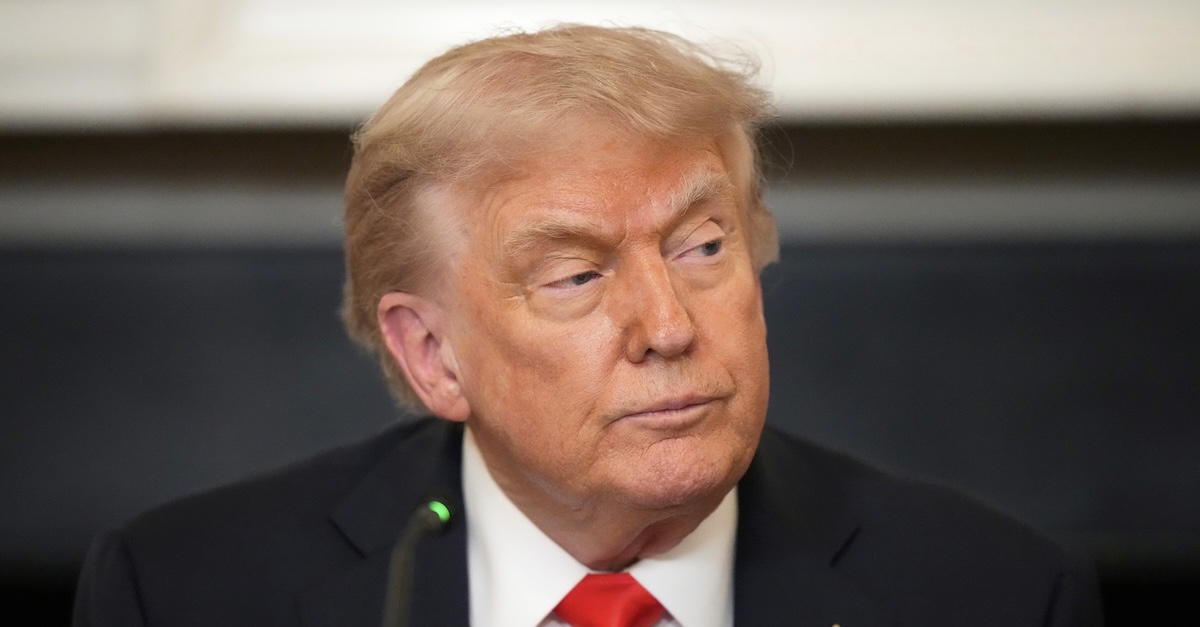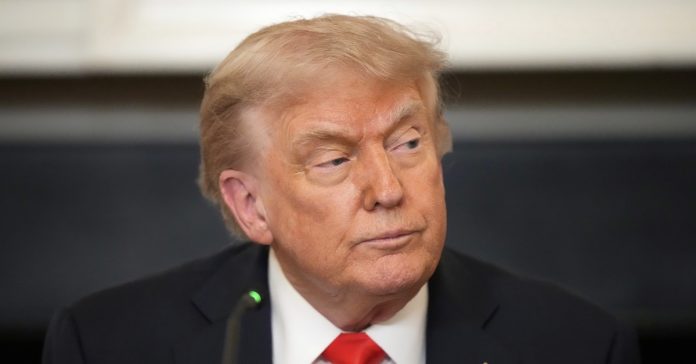
President Donald Trump attends a meeting with the Fraternal Order of Police in the State Dinning Room of the White House, Thursday, June 5, 2025, in Washington (AP Photo/Alex Brandon).
A federal judge in California has temporarily blocked the Trump administration from enforcing an executive order seeking to strip more than 1 million federal employees of their collective bargaining rights.
U.S. District Judge James Donato on Tuesday issued a preliminary injunction barring the administration from enforcing the order that would exclude “an unprecedented number” of the federal workforce from labor law codified by Congress more than 60 years ago, reasoning that the measure was retaliatory in nature and exceeded the scope of the president”s authority.
In the underlying lawsuit, a coalition of unions led by the American Federation of Government Employees (AFGE) challenged Trump’s March 27, executive order, which excluded more than 40 cabinet departments, agencies, and subdivisions across the federal government from labor law protections under an exemption requiring the employees at those agencies have a “primary function” in “intelligence, counterintelligence, investigative, or national security work.”
As the court noted, agencies determined to have national security and intelligence as a “primary function” included the National Institute of Allergy and Infectious Diseases, the Animal and Plant Health Inspection Service, the Office of the Chief Information Officer of the Social Security Administration, and many others.
“President Trump applied the national security label to an unprecedented swath of federal agencies, including whole cabinet departments for the first time in history,” Donato wrote in the 29-page order. “The scope of this classification greatly exceeded any prior executive order.”
The plaintiffs claimed Trump’s order was little more than a thinly-veiled effort to drastically shrink the federal workforce by making it easier to conduct mass firings. The complaint also asserted that the measure amounted to little more than political retribution over a series of lawsuits brought by unions associated with the plaintiffs challenging various Trump administration policies.
“Plaintiffs have raised serious questions under the First Amendment that warrant further litigation,” the order states. “Plaintiffs have also demonstrated a strong likelihood of irreparable harm from the loss of their collective bargaining and allied rights under the FSLMRS [Federal Service-Labor Management Relations Statute], that the balance of hardships tips sharply in their favor, and that an injunction would be in the public interest. Consequently, enforcement of the Executive Order against plaintiffs is enjoined to preserve the status quo until trial.”
Notably, a “fact sheet” published along with the executive order called out “hostile federal unions” that describe themselves as “fighting back” against the administration, claiming they had “declared war on President Trump’s agenda.” While supporting “constructive partnerships” with federal unions that backed him, the president explicitly stated that his administration “will not tolerate” groups opposing its policy initiatives.
In the order, Donato said that the White House’s fact sheet “expressed a clear point of view” that was unquestionably “hostile to federal labor unions and their First Amendment activities.”
“The Fact Sheet called out federal unions for vocal opposition to President Trump’s agenda,” the judge wrote. “It condemned unions who criticized the President and expressed support only for unions who toed the line. It mandated the dissolution of long-standing collective bargaining rights and other workplace protections for federal unions deemed oppositional to the President. All of this is solid evidence of a tie between the exercise of First Amendment rights and a government sanction.”
The plaintiffs, according to the court, succeeded in raising “a serious question” as to whether Trump’s executive order exclusions were made in “retaliation for protected speech.”
Donato, a Barack Obama appointee, wrote that he was not “second-guessing” Trump’s national security determinations, as the president is “owed deference on such matters,” but emphasized that a claim of national security “does not, of course, automatically negate the Constitution, particularly with respect to the First Amendment.”

